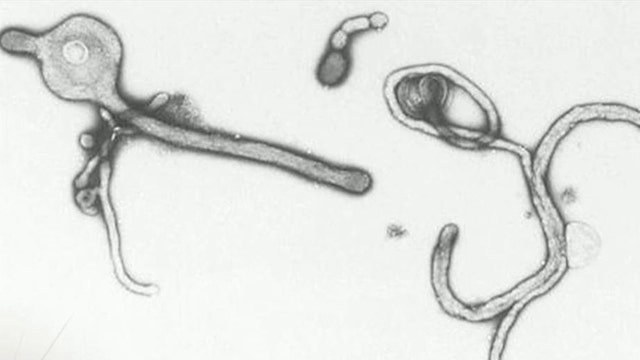The White House was forging ahead Monday with a three-day Washington summit inviting delegations from nearly 50 African countries, despite growing fears about the outbreak of the deadly Ebola virus.
Administration officials say they are taking additional precautions to screen visitors for the disease in both Africa and the United States. Despite some leaders canceling plans to attend due to the outbreak, President Obama made clear last week that the summit would go on.
"It is going to be an unprecedented gathering of African leaders," Obama said Friday.
The high-profile summit in the nation's capital is meant to tackle issues ranging from food security to Africa's business climate to terrorism. It follows on Obama's trip to Africa last summer.
But the surging outbreak of Ebola in West Africa raised questions about whether the summit should even go forward. Already, the presidents of Liberia and Sierra Leone have canceled.
Obama and government health officials, though, emphasized that they could keep to the agenda, with the proper precautions.
The government is "taking the necessary steps domestically to protect the American people," an administration official said in the run-up to the summit. "We have no plans to change the agenda of the summit, but we will obviously adapt as needed and in consultation with our partners, depending on their requirements."
Obama noted that those coming from countries "that have even a marginal risk or an infinitesimal risk of having been exposed in some fashion" will undergo screening in their country of departure and additional screening in the U.S. So far, the outbreak is concentrated in Guinea, Liberia and Sierra Leone.
"We feel confident that the procedures that we've put in place are appropriate," he said.
Thomas Frieden, director of the Centers for Disease Control and Prevention, likewise voiced confidence in the precautions being taken.
"There are 50 million travelers from around the world that come to the U.S. each year that are essential to our economy, to our families, to our communities," Frieden told "Fox News Sunday." "What we can do is put in place sensible screening procedures."
From the CDC's perspective, he said the most important thing is to "stop problems at the source."
He said: "And the source here is in Africa. That's why we're surging and putting 50 CDC disease control specialists on the ground in these three countries to help them find, respond to and stop the spread of the disease."
While the summit gets underway, a second American stricken with Ebola is expected to be flown to the U.S. for treatment on Tuesday, following a colleague who was admitted over the weekend to Emory University Hospital's infectious disease unit.
There is no cure for Ebola, which causes hemorrhagic fever that kills at least 60 percent of the people it infects in Africa. Ebola spreads through close contact with bodily fluids and blood, meaning it is not spread as easily as airborne influenza or the common cold. Africa's under-developed health care system and inadequate infection controls make it easier for the Ebola virus to spread and harder to treat.
Meanwhile, with the D.C. summit, Obama is trying to follow up on his visits to Africa and fulfill longstanding expectations that he would focus on the beleaguered continent.
Obama's first trip to sub-Saharan Africa as president was an overnight stop in Ghana in 2009. But it was four years before Obama returned to Africa, a yawning gap that raised questions about the extent of his commitment to continent. Unlike his predecessor George W. Bush, who launched a $15 billion program to address HIV and AIDS, Obama seemed to be lacking a signature Africa initiative. And his administration's focus turned instead to the Arab Spring movement sweeping through the Middle East, a heavily promoted rebalance toward Asia and a slew of pressing security concerns.
Analysts say Obama's second term has brought about a more robust focus on Africa. The president made a three-country trip to the continent last summer and aides say he's likely to travel there again before the end of his second term. He's also launched a new "Power Africa" initiative that aims to leverage billions in private sector commitments to bring electricity to 20 million households in sub-Saharan Africa. And he's launched a fellowship program for young African leaders that received more than 50,000 applications for 500 slots this year.
The Associated Press contributed to this report.













































